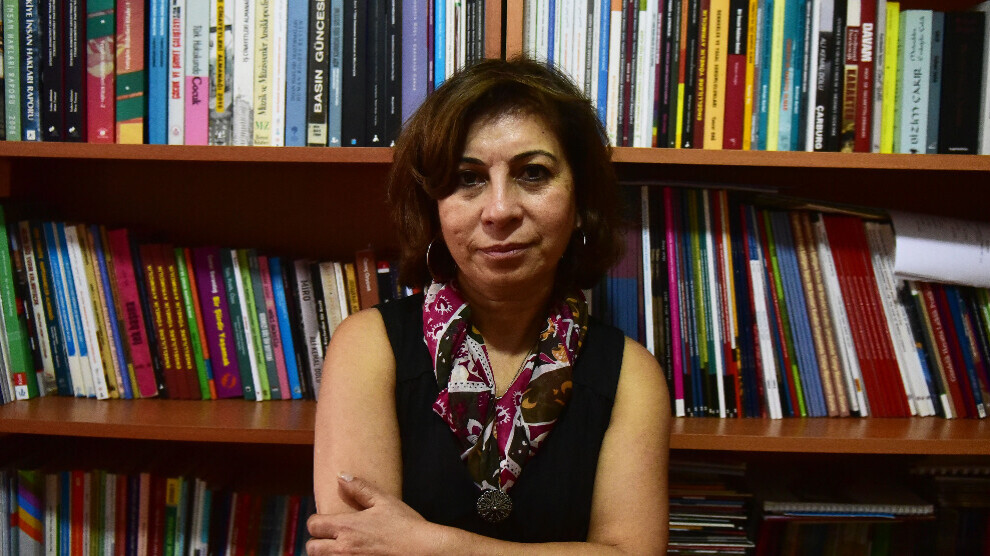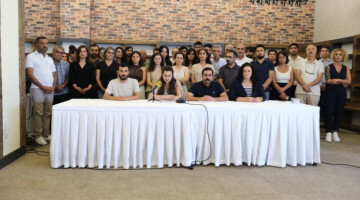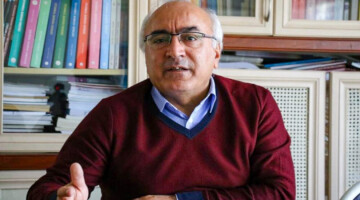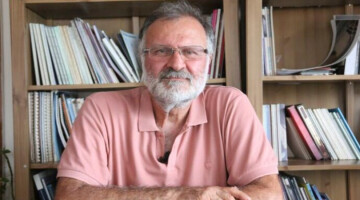The situation of sick prisoners in Turkey is dramatic. Time and again, prisoners come out of prison in coffins at best. Most recently, Tahir Güldal, a political prisoner suffering from cancer, died on 9 December, 13 days after the end of his sentence. Güldal had previously been chained to a bed in hospital. For many prisoners, release is repeatedly postponed after the end of the regular prison term. One of the reasons for this is a remorse law that requires prisoners to confess to the offences they are accused of. With this regulation, political prisoners in particular are hit hard.
"ISOLATION IS THE CAUSE OF THE INCREASE OF DISEASES IN PRISON"
Gülsen Yoleri, co-chair of the Human Rights Association (IHD) Istanbul office and initiator of the so-called "F-sessions", a protest action to draw attention to the situation of sick prisoners every Saturday at Taksim Square, demands an urgent solution regarding the dramatic situation in prisons.
The list of seriously ill prisoners is getting longer and longer, Yoleri explained, pointing to the poor prison conditions and especially the intensification of isolation as the cause. The F-type prisons play an important role in this. This change began on Imrali, said the human rights activist and continued: "When we studied the effects of the isolation system on prisoners as IHD even before the F-type prisons were built, we found that isolation is used as a method of torture in the prisons and it causes both physical and psychological deterioration in the prisoners. We saw that isolation mainly causes psychosomatic disorders, which translates physically into serious diseases such as cancer and ulcers."
SOLIDARITY HELPS PRISONERS - ISOLATION SHOULD BREAK SOLIDARITY
Yoleri warned that in addition to isolation in prisons, malnutrition, inadequate ventilation and hygiene, lack of access to clean water and stress led to the rapid progression of diseases. “The only factor that has a positive effect on these diseases is solidarity. There are fewer diseases in shared rooms than in isolation. Isolation is directed precisely against this solidarity. The IHD representative went on to describe that prisoners are repeatedly denied medication, that they are not admitted to hospitals, and that if they are, even the examinations take place in handcuffs and thus become torture for the prisoners.”
"ISOLATION IS GETTING WORSE AND WORSE"
Yoleri also noted that, instead of abolishing solitary confinement torture, it is becoming more and more severe. She said that the new types of prisons, S and Y, are aggravated solitary confinement facilities that house prisoners with aggravated life sentences in particular. However, aggravated life sentences would already be imposed for freedom of expression, which could be classified as a "terrorist offence". These prisons are therefore mainly occupied by political prisoners, she said.
SUSPECTED DEATHS BEHIND BARS
Yoleri warned that isolation directly attacks the nature of humans as social beings and pointed to the many suspicious deaths in isolation cells: "For example, a person is arrested and the same day it is claimed that he or she committed suicide. These isolation conditions are precisely the reason why all these deaths have to be classified as suspicious. This is because there are no witnesses and the way the incidents occurred suggests a suspicion other than suicide - as in the case of Garibe Gezer. She said that she was being pressured and tortured, that they wanted to kill her and called for help. Isolation therefore leads to illness and death as a method of torture."
"PROCEDURE FOR SUSPENSION OF EXECUTION MUST BE CHANGED"
Yoleri stressed that both the requirement of a report from the notorious Forensic Medicine Institute (ATK), as stipulated in Article 16 of the Enforcement Act, and the procedure for determining whether the person poses a security risk, are major obstacles for sick prisoners. She stated, "Even if the Forensic Medicine Institute determines incapacity, many sick prisoners are not released for security reasons. Abdullah Turan is one of the most drastic examples in this regard. Although he is paralysed from the neck down and the ATK has issued an expert opinion stating that he cannot remain in prison, the suspension was prevented for a long time because the police and the public prosecutor's office claimed that he posed a danger to society. So the issue here is not that Turan is a danger to society, but rather the openly hostile attitude of the police. If there is an illness and a certificate states that the prisoner is unfit to be detained, the execution must be suspended so that the prisoner can stay outside until he recovers."
"WE EXPECT AN IMMEDIATE CORRECTION, NOT DELAYING TACTICS"
Yoleri recalled that Justice Minister Bekir Bozdağ (AKP) had announced that a new regulation for sick prisoners would be created. She underlined that nothing has been done in this sense for three months. In the first eleven months of this year alone, 61 prisoners died, many of them under suspicious circumstances, Yoleri said and appealed to the Minister of Justice: "Keep your promise, we expect correction and not delaying tactics."















